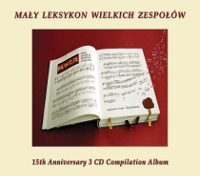THE WHISKY PRIESTS
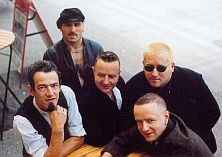 Back in the Nineties I was fortunate enough to often be in contact with Gary and Glenn Miller, identical twins who had formed one of the greatest roots bands ever to come out of the UK. I managed to catch the guys in concert (amazing!), reviewed many of their albums, and even twice had them on the cover of Feedback. But over the years we firstly lost touch and then the band broke up (totally unrelated, honest!). Gary had to take a long sabbatical from music due to illness, but over the last few years gradually became more active and we started exchanging emails, then one day a parcel arrived containing not only a T-shirt, but four of the studio albums, two live albums, two compilations of early material, a new EP and also a solo album from Gary himself! So, a lot of music, and even though I wrote about many of these in the past, it was some time ago, so heads down for a potted history of an incredible band.
Back in the Nineties I was fortunate enough to often be in contact with Gary and Glenn Miller, identical twins who had formed one of the greatest roots bands ever to come out of the UK. I managed to catch the guys in concert (amazing!), reviewed many of their albums, and even twice had them on the cover of Feedback. But over the years we firstly lost touch and then the band broke up (totally unrelated, honest!). Gary had to take a long sabbatical from music due to illness, but over the last few years gradually became more active and we started exchanging emails, then one day a parcel arrived containing not only a T-shirt, but four of the studio albums, two live albums, two compilations of early material, a new EP and also a solo album from Gary himself! So, a lot of music, and even though I wrote about many of these in the past, it was some time ago, so heads down for a potted history of an incredible band.
The Whisky Priests were formed by Gary (acoustic guitar, vocals) and Glenn (accordion, backing vocals) in 1985. With an original line-up made up of old school friends, they played their first gig in their hometown of Durham on 4th October 1985. Within two months, and after only 2 gigs, they recorded their first original song, ‘Danny's Hard Life’, written by Gary, for a local compilation album. They soon started to make a real name for themselves and at the beginning of 1987 was one of the last bands to appear on The Tube, releasing their debut single the same year. Due to the continued success of the band they signed to a professional recording and publishing company and released their debut album ‘Nee Gud Luck’ in 1989.
With the album available, they started touring in earnest and found that they were well received on the continent as well as in their home country, not only stealing the show at the Cambridge Folk Festival in 1990, where they were hailed as “the stars of the weekend” but also headlining to 20,000 people at the Rockspektakel in Hamburg. But, there were already issues with the publishing company, so for the next two years the band had to turn their back on the UK and instead concentrated on Europe. A brief truce took place between the two parties, and a compilation of early singles, EP’s and demos, ‘The First Few Drops’ was released while the band went into the studio to record their first new music for more than two years.
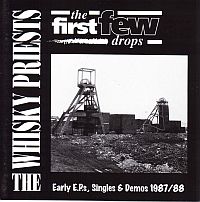 It was originally released in 1991, but this is the 1994 remaster with additional tracks and loads of sleeve notes. Although not the original line-up, this was the most solid that the band had had until this date with Gary and Glenn being joined by Michael Stephenson (bass, vocals), Bill Bulmer (mandolin, harmonica, bouzouki, ) and Sticks (drums). Not surprisingly, the band sound raw and frenetic, as they bring a real punk enthusiasm to songs such as “Wise Man” where it is as if early Pogues have been transported from Ireland to the North East. Gary has a very distinctive singing style, and this combined with the lyrics he provides and their musical approach leads to a feeling of honesty that is often missing from music. Gary sings about the area he grew up in, and the feeling is that even if he hasn’t been down the mines himself then his family and friends have been and that this experience has made him the man he is. Reading the lyrics of “Grandfatha’s Fatha” is pure poetry, nothing more or less, as he tells the story of a man who saw his father killed “in that dark hole that was called his place of work”. The guys rip through the song with Glenn at the forefront, all being driven along by the rhythm section. Mind you, if you are a Fairport fan then listen to Glenn taking the lead on “The Hexhamshire Lass” – it fairly blasts along.
It was originally released in 1991, but this is the 1994 remaster with additional tracks and loads of sleeve notes. Although not the original line-up, this was the most solid that the band had had until this date with Gary and Glenn being joined by Michael Stephenson (bass, vocals), Bill Bulmer (mandolin, harmonica, bouzouki, ) and Sticks (drums). Not surprisingly, the band sound raw and frenetic, as they bring a real punk enthusiasm to songs such as “Wise Man” where it is as if early Pogues have been transported from Ireland to the North East. Gary has a very distinctive singing style, and this combined with the lyrics he provides and their musical approach leads to a feeling of honesty that is often missing from music. Gary sings about the area he grew up in, and the feeling is that even if he hasn’t been down the mines himself then his family and friends have been and that this experience has made him the man he is. Reading the lyrics of “Grandfatha’s Fatha” is pure poetry, nothing more or less, as he tells the story of a man who saw his father killed “in that dark hole that was called his place of work”. The guys rip through the song with Glenn at the forefront, all being driven along by the rhythm section. Mind you, if you are a Fairport fan then listen to Glenn taking the lead on “The Hexhamshire Lass” – it fairly blasts along.
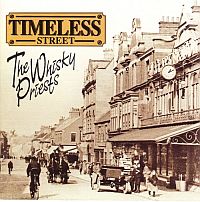 ‘Timeless Street’ was originally released in 1992, but the version here is the reissue which took place in 1994 after the two sides finally managed to reach an agreement, and this was remastered by Fred Purser with additional songs from the same session. The band was always prone to line-up changes, and the line-up was now Gary, Glenn, Mick Tyas (bass, mandolin, vocals), Kevin Wilson (mandolin, bouzouki), Simon Chantler (fiddle), and Piers Burgoyne (drums). Having a fiddle player available gives the band more opportunity to add additional melodies and harmonies, and there is also more solidity and control. Looking back at the review I wrote of this back in 1995, I can see that my view of this album hasn’t changed over the years. As I said back then, the energy has been slightly reigned in without being diminished and Gary’s songs have gained more depth. His voice is stronger and overall there is the feeling of a band in total control, knowing exactly what they wanted to achieve. The use of Bearpark & Esh Colliery Band on “Easington” definitely provides a lot of depth and added emotion. “Goblins’ is a stunning instrumental, with wonderful interplay, while “The Raven” is still one of my all-time favourite WP numbers. It commences with long-held down organ chords and lead vocal from Mick, until after two minutes it totally changes character as the rest of the guys join in and Gary takes control again. In 1995 I said “There is not a weak point on this record, ” and I was right.
‘Timeless Street’ was originally released in 1992, but the version here is the reissue which took place in 1994 after the two sides finally managed to reach an agreement, and this was remastered by Fred Purser with additional songs from the same session. The band was always prone to line-up changes, and the line-up was now Gary, Glenn, Mick Tyas (bass, mandolin, vocals), Kevin Wilson (mandolin, bouzouki), Simon Chantler (fiddle), and Piers Burgoyne (drums). Having a fiddle player available gives the band more opportunity to add additional melodies and harmonies, and there is also more solidity and control. Looking back at the review I wrote of this back in 1995, I can see that my view of this album hasn’t changed over the years. As I said back then, the energy has been slightly reigned in without being diminished and Gary’s songs have gained more depth. His voice is stronger and overall there is the feeling of a band in total control, knowing exactly what they wanted to achieve. The use of Bearpark & Esh Colliery Band on “Easington” definitely provides a lot of depth and added emotion. “Goblins’ is a stunning instrumental, with wonderful interplay, while “The Raven” is still one of my all-time favourite WP numbers. It commences with long-held down organ chords and lead vocal from Mick, until after two minutes it totally changes character as the rest of the guys join in and Gary takes control again. In 1995 I said “There is not a weak point on this record, ” and I was right.
1993 saw the release of their first live album, ‘Bloody Well Live!’ This is a great album, capturing the band in Europe. I didn’t have a copy to review this time, but I see that in 2000 they released a special edition 23 track complete version so I have just popped off to Bandcamp to purchase one. Nice and easy – looking forward to playing that later.
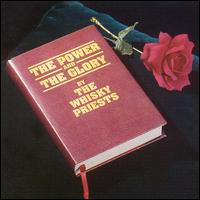 Between 1992 and 1996 The Whisky Priests released 5 albums of new material in 5 years and played over 600 concerts in 16 different countries, appearing many times on TV and radio throughout Europe. Towards the end of 1993 saw their next studio album, ‘The Power And The Glory’. Again recorded with Fred Purser, the line-up had changed with Kevin Wilson being replaced by Paul Carless, Piers by Nick Buck, and a decision not to have a fiddler in the band (although Mike McGrother did add some as a guest). Yet again there was a shift in the music with the guys building on their recent experiences and growing all the time.
Between 1992 and 1996 The Whisky Priests released 5 albums of new material in 5 years and played over 600 concerts in 16 different countries, appearing many times on TV and radio throughout Europe. Towards the end of 1993 saw their next studio album, ‘The Power And The Glory’. Again recorded with Fred Purser, the line-up had changed with Kevin Wilson being replaced by Paul Carless, Piers by Nick Buck, and a decision not to have a fiddler in the band (although Mike McGrother did add some as a guest). Yet again there was a shift in the music with the guys building on their recent experiences and growing all the time.
It builds on the passion and fire of their live act, combined with a more reflective air and manages to bring the North to life with a passion that is rarely heard these days. This is music which is honest and full of integrity. In many ways this album is more Levellers than Pogues and is one of their most balanced – Mick even takes lead for a whole song, “Three Rivers” (for whi he also provided the lyrics). There is the raucous “The Man Who Would Be King” or the more balladic “When The Wind Blows, Billy Boy” (which was also released as a single). Back then I said “If you like folk-rock, roots music or whatever you want to call it then The Whisky Priests are a band that you should be listening to.” So very true.
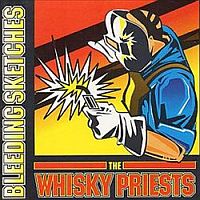 In 1995 the band had come off an eighteen month tour and had planned in time to record the next album. However, Paul Carless decided that it was time for him to move on which left the band as a four-piece with recording time booked. On and off over the previous five years there had been discussions between Gary and North-Eastern poet Keith Armstrong of recording an album using Keith’s poems as lyrics, so Gary thought that this might be just the opportunity. The band got together some friends as guests, rehearsed the new songs and went into the studio to record songs that had not been roadtested, for the first time in their career. So in many ways, ‘Bleeding Sketches’ should be a disaster, but for me it is one of my favourites of their entire career.
In 1995 the band had come off an eighteen month tour and had planned in time to record the next album. However, Paul Carless decided that it was time for him to move on which left the band as a four-piece with recording time booked. On and off over the previous five years there had been discussions between Gary and North-Eastern poet Keith Armstrong of recording an album using Keith’s poems as lyrics, so Gary thought that this might be just the opportunity. The band got together some friends as guests, rehearsed the new songs and went into the studio to record songs that had not been roadtested, for the first time in their career. So in many ways, ‘Bleeding Sketches’ should be a disaster, but for me it is one of my favourites of their entire career.
In the booklet there are details at the beginning of each set of lyrics as to what inspired the words, and there is a strong mix of observation combined with a deep sense of history and roots. For the first time The Whisky Priests have performed songs for which they did not write the words, but instead have worked at providing the music, which makes the words come alive. First up is “Everybody’s Got Love Bites But Me”, which is both an observation on society and a bleak indictment. But instead of being a mournful lament this is an in your face number that would soon become a concert favourite. Compare that with the powerful ‘Widows of Hartley’ (about the Hartley Mining Disaster of 1862, which claimed 204 lives). The music and words work in perfect harmony to be entertaining and extremely thought provoking at the same time. There is a harnessed passion in the music that really brings the images to life. Considering the circumstances behind the recording of this it is amazing that they managed to produce an album of such quality – this is a great one to start with if you have never come across WP before.
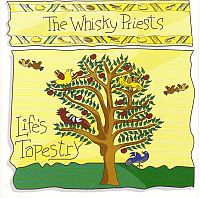 Only one year later and the next album, ‘Life’s Tapestry’, was out which saw quite a change in line-up and musical approach. While Gary and Glenn were of course both there, the rest of the line-up was all new. In addition, the guys had gone more electric. Although electric guitars had featured before, this was the first time that they had been used to such extent. Joining Gary on acoustic and electric guitars was Thomas Fisk (who also provided mandola, mandolin, euphonium and backing vocals) with Mick Howell on bass/vocals and Paul Stipetic on drums/vocals.
Only one year later and the next album, ‘Life’s Tapestry’, was out which saw quite a change in line-up and musical approach. While Gary and Glenn were of course both there, the rest of the line-up was all new. In addition, the guys had gone more electric. Although electric guitars had featured before, this was the first time that they had been used to such extent. Joining Gary on acoustic and electric guitars was Thomas Fisk (who also provided mandola, mandolin, euphonium and backing vocals) with Mick Howell on bass/vocals and Paul Stipetic on drums/vocals.
The album starts with the guys in a cappela singing “Here comes the ranting lads, Three cheers for the ranting Lads” before crunching into a rock number with twin electric guitars riffing hard, Glenn providing melody over the top, harmony vocals etc. It’s all here! This soon became the concert opener, and no surprise there as the lads just belt it out. Who says that folk when mixed with rock has to be laid back and boring? Again, there are definite hints of The Pogues on this. It is one hell of an opener and proves that The Whisky Priests are always a force to be reckoned with. Gary’s lyrics are always thoughtful, and none more so than on ‘He’s Still My Son’, where he sings from the viewpoint of a mother whose son is a murderer. Although she realises what he has done and knows that he has no respect for her, she will still be waiting for him in paradise. This was their heaviest album to date with some strong axe-work and the result is just superb.
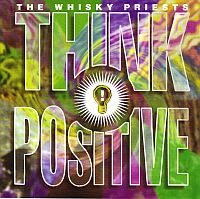 May 1998 saw the delivery of what was to be the final studio album from the band, ‘Think Positive’. This time Gary and Glenn were joined by Hugh Bradley (mandola, mandolin, whistle, flute, electric guitar), Andy Tong (fretted and fretless bass) and Cozy Dixon (percussion). Chuck Fleming also made an appearance on violin, piano and mandolin. This album has more depth to it than has been apparent with The Whisky Priests before. Prior to this their trademark has been rousing roots rock, but here even the more boisterous songs seem to have a more restrained element to it. That seems a little strange when you consider that this album was recorded basically live (no more than three takes a song) with a minimum of overdubs. Even though ‘What I Could Have Been’ fairly trots along there is the impression that in a sweaty hall the amps will be cranked up a little more and what is a bloody good song will be dragged kicking and screaming more into the classic. ‘Car Boot Sale’ is a comic number, which is nothing more or less than a ‘Blaydon Races’ for the 21st Century. It is not the only place where the guys show that local band Lindisfarne had made an impression on them.
May 1998 saw the delivery of what was to be the final studio album from the band, ‘Think Positive’. This time Gary and Glenn were joined by Hugh Bradley (mandola, mandolin, whistle, flute, electric guitar), Andy Tong (fretted and fretless bass) and Cozy Dixon (percussion). Chuck Fleming also made an appearance on violin, piano and mandolin. This album has more depth to it than has been apparent with The Whisky Priests before. Prior to this their trademark has been rousing roots rock, but here even the more boisterous songs seem to have a more restrained element to it. That seems a little strange when you consider that this album was recorded basically live (no more than three takes a song) with a minimum of overdubs. Even though ‘What I Could Have Been’ fairly trots along there is the impression that in a sweaty hall the amps will be cranked up a little more and what is a bloody good song will be dragged kicking and screaming more into the classic. ‘Car Boot Sale’ is a comic number, which is nothing more or less than a ‘Blaydon Races’ for the 21st Century. It is not the only place where the guys show that local band Lindisfarne had made an impression on them.
But out of the twelve songs and one instrumental there are two on which I would like to focus attention in particular. The first is ‘Alice In Wonderland’, which is a song about people attempting to take control of their lives, reaching for their dreams. It starts off as a fairly typical number with good mandolin/accordion work but as well as some wonderful fiddle parts what really lifts this is the vocals. There are some wonderful harmony vocals care of Hugh and Andy that are particularly effective. It is from this song that ‘Think Positive! Think confidence! Think I am in command!’ is taken. The other song is the longest on the album (only six minutes), which is ‘The Man Who Sold His Town’. What is effective about this is that for the first part there are no ‘folk elements’, with just a rock band format. It is only later during the instrumental part that these make an appearance, a radical departure to normal Priests material, which works extremely well indeed.
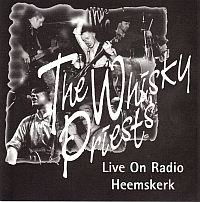 The next release from the band, ‘Live On Radio Heemskirk’, was limited to just 1000 copies and was limited to just 1000 copies which were given away free at The Markthalle on the 10th October that year. This is the first time that I had come across it, and with the same line-up as the previous studio album this is a fascinating insight into the band. The band played live for various numbers (mostly from ‘Think Positive’), but for me the best part of this are the three interviews which total more than 25 minutes in length. Recorded in 1997 this was before the release of the album but provides a lot of information about the band, where they had come from and where they felt they were going to. At the time I was in touch with the guys quite a lot and even I wasn’t aware of this release, so I am sure that many fans of the band are going to be interested that this has now been made available as a download.
The next release from the band, ‘Live On Radio Heemskirk’, was limited to just 1000 copies and was limited to just 1000 copies which were given away free at The Markthalle on the 10th October that year. This is the first time that I had come across it, and with the same line-up as the previous studio album this is a fascinating insight into the band. The band played live for various numbers (mostly from ‘Think Positive’), but for me the best part of this are the three interviews which total more than 25 minutes in length. Recorded in 1997 this was before the release of the album but provides a lot of information about the band, where they had come from and where they felt they were going to. At the time I was in touch with the guys quite a lot and even I wasn’t aware of this release, so I am sure that many fans of the band are going to be interested that this has now been made available as a download.
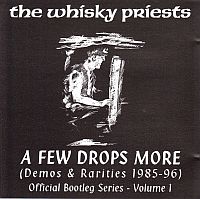 And if that wasn’t enough, also in 1998 the band decided to make yet another limited edition available, ‘A Few Drops More’, where there were only 500 copies pressed. This one really is for the fans as while there are a few numbers from the ‘90’s this concentrates on the earliest period of the band and even includes their very first recording from 1985, “Danny’s Hard Life” which is raw to say the least. The album works its’ way through in chronological order, and fans will enjoy hearing songs such as “Grandfatha’s Fatha” which is here in it’s very first recorded version from February 1988. These songs show how the band have progressed and changed over the years, and how they were learning their craft in the live environment and then bringing that to bear in the studio. Fred Purser has done a great job remastering these, and of the 21 songs contained on here only 1 is previously released.
And if that wasn’t enough, also in 1998 the band decided to make yet another limited edition available, ‘A Few Drops More’, where there were only 500 copies pressed. This one really is for the fans as while there are a few numbers from the ‘90’s this concentrates on the earliest period of the band and even includes their very first recording from 1985, “Danny’s Hard Life” which is raw to say the least. The album works its’ way through in chronological order, and fans will enjoy hearing songs such as “Grandfatha’s Fatha” which is here in it’s very first recorded version from February 1988. These songs show how the band have progressed and changed over the years, and how they were learning their craft in the live environment and then bringing that to bear in the studio. Fred Purser has done a great job remastering these, and of the 21 songs contained on here only 1 is previously released.
Remember that gig at the Markthalle in Hamburg where they gave away the ‘Heemskirk’ CD? Well, that night they recorded the show with the aim of releasing a full concert double CD and accompanying video. However, that night there was an issue with the recording equipment and a lot of the gig was unusable. In the end they decided that what was left was still an accurate portrayal of the band at the time and released it as a single CD (I still have the video stored safely away – it was a great gig!). I had seen them play at a pub in Camden, but here they were on a large stage with a full lighting rig and a crowd that puts British audiences to shame. Yet another example of us having great bands but just not appreciating them. They kick off with a rousing verions of “Ranting Lads” that just brings the house down and follows it with one stomping rabble rouser after another.
I am always surprised that such a broad vocal can come from one so small, as Gary is not the largest frontman in the world, but passion he brings into his music is incredible. They are proud of their roots and some of their greatest songs such as ‘Grandfatha’s Fatha’ and ‘The Oakey Strike Evictions’ show this. However, not all of the songs are about the North East, and ‘Alice In Wonderland’ tells us all to be positive in our outlook. Nearly 15 years ago I said “Call them roots, call them folk, call them rock, call them what you like. But never let it be said that The Whisky Priests are anything but a bloody good band who wear their hearts on their sleeve and are honest in their music. If you are fed up with yet another created pop band on the radio and want to hear some real earthy music with passion then this is the band for you.”
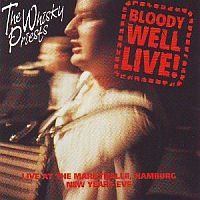 In 2000 they reissued ‘Bloody Well Live’ as a ‘Special Edition’ and Gary and Glenn recorded an acoustic album with Joseph Porter from ‘Blyth Power’ as ‘Mad Dogs and Englishmen’, and performed 33 live shows around Europe. But the band was at an end, and their final studio recording was “Full Circle” which was written especially for a compilation album.But that was it. Finish. No more. The band kept going for a while longer in one form or another (stability never really was one of their strong points), but only as a live act, officially disbanding in 2002 and their last ever gig was in 2004.
In 2000 they reissued ‘Bloody Well Live’ as a ‘Special Edition’ and Gary and Glenn recorded an acoustic album with Joseph Porter from ‘Blyth Power’ as ‘Mad Dogs and Englishmen’, and performed 33 live shows around Europe. But the band was at an end, and their final studio recording was “Full Circle” which was written especially for a compilation album.But that was it. Finish. No more. The band kept going for a while longer in one form or another (stability never really was one of their strong points), but only as a live act, officially disbanding in 2002 and their last ever gig was in 2004.
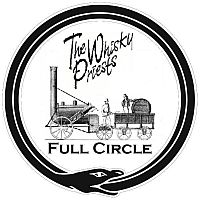 Did I say ‘last ever?’ After way too long the guys could well be back! Gary is back in business with a new solo album, and Glenn has picked up his accordions for the first time in many years. Gary has also been in touch with some previous members (there are more than 50 to choose from..) and there is hope that there may just be some performances later this year. Remember that last song they recorded? ‘Full Circle’ is now the first song on a 5 track EP, and while the second (a remix of “Alice In Wonderland”) was available on another collection the last three songs are acoustic numbers that are previously unavailable.
Did I say ‘last ever?’ After way too long the guys could well be back! Gary is back in business with a new solo album, and Glenn has picked up his accordions for the first time in many years. Gary has also been in touch with some previous members (there are more than 50 to choose from..) and there is hope that there may just be some performances later this year. Remember that last song they recorded? ‘Full Circle’ is now the first song on a 5 track EP, and while the second (a remix of “Alice In Wonderland”) was available on another collection the last three songs are acoustic numbers that are previously unavailable.
All of the WP releases, including the singles etc, are all now available on Bandcamp at simply silly prices, so there just couldn’t be a better time to investigate one of the very finest roots bands ever to come from the UK. And if they play again later this year you had better go and see them – I’ll be envious to say the least.
http://whiskypriests.bandcamp.com

